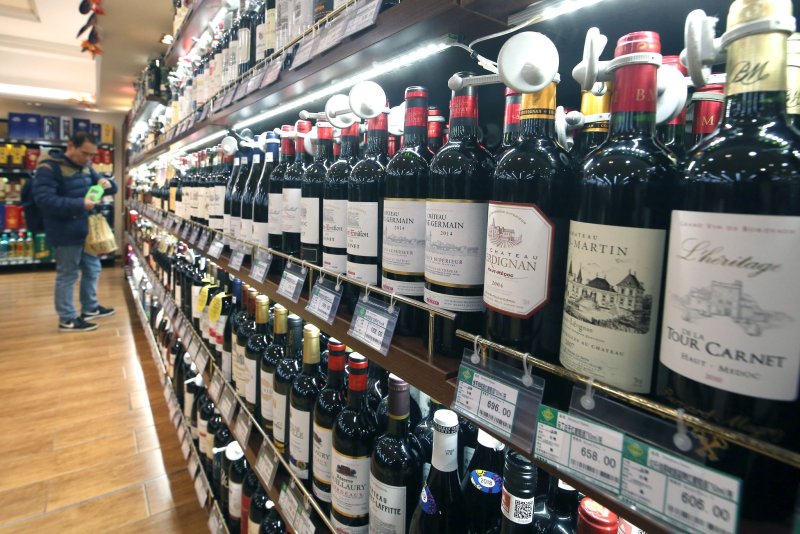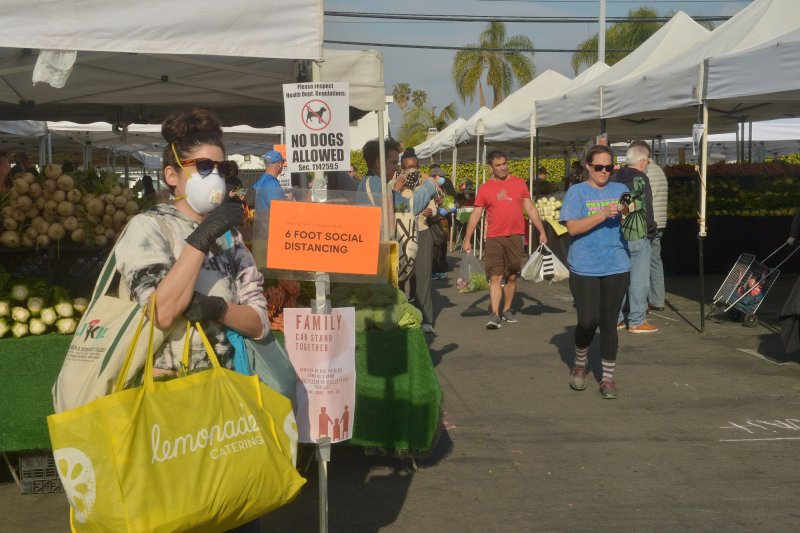 AFP / Kena BetancurVolunteers from City Harvest food bank distribute food in Harlem, New York City
AFP / Kena BetancurVolunteers from City Harvest food bank distribute food in Harlem, New York City
New York food banks have become inundated with newcomers deprived of income since the near-total halt of business in the United States' economic capital.
Sacks of oranges, sweet potatoes and onions are spread over three tables at an open-air market in Washington Heights, a neighborhood in the north of Manhattan. Sterilized milk and cans of tuna and salmon cover three others.
Hundreds of people came over the weekend to restock at the distribution center, one of many run by City Harvest, a major New York-based charity.
There are no long lines reminiscent of the soup kitchens of the 1930s. Instead, people trickle in, often wearing masks for protection and keeping their distance from each other under the direction of market volunteers.
Among the customers is Lina Alba, 40, a single mother with five children aged between 11 and 23. She worked as a maid in a Manhattan hotel until it closed two weeks ago.
Her two oldest children also lost their jobs.
 AFP / Kena BetancurA man receives bags with food from City Harvest food bank
AFP / Kena BetancurA man receives bags with food from City Harvest food bank
"It is my first time," she said. "We need the help now. This is crazy. So we don't know what's gonna happen in a few weeks."
She's trying to stay positive, though. "At least I'm spending time with my kids... I am the teacher, I am the mom -- I am everything."
"We are alive, we are healthy, we just need to pray."
It took the single mother a week to register for unemployment -- the service flooded, pointing to much worse unemployment numbers than those announced by the federal government on Thursday.
But on Friday, "I did it, finally," Alba said, relieved.
The benefits should start arriving in three weeks. Alba also hopes to receive soon at least $1,200 from the federal government, thanks to a historic aid package passed last week by Congress.
"It's not gonna be enough," but "you're gonna appreciate anything right now," she said, noting that "a lot of people" need help.
"It is the whole entire city."
- Millions need help -
Jose Neri, 51, is one of many Hispanic employees who worked in now-closed New York restaurants. He also came to a food bank for the first time.
There are five people in his family. "We're using our savings to survive," he said in Spanish, wearing a mask and gloves in an effort to prevent himself from catching the virus.
 AFP / Kena BetancurPeople wait in line for the City Harvest food bank, in Washington Heights, New York City
AFP / Kena BetancurPeople wait in line for the City Harvest food bank, in Washington Heights, New York City
"We've got what we need to hold it together for now," he said. He is also counting on the federal government's promised assistance to low-income workers.
Jhordana Ramirez, 39, has to keep working, despite the high risk of infection in a city that has recorded tens of thousands of cases.
She's a home caregiver for senior citizens, who "depend 100 percent" on her, she explained in Spanish.
The pandemic has had an "enormous" effect on her household, she said. Her husband and oldest daughter lost their jobs. Her youngest daughter, just eight years old, is "anxious" and can't keep still.
"I try to save as much as possible, especially for the rent, bills like electricity, cable, food and all those things," she said. She is also impatiently waiting for her federal check.
City Harvest employee Geraldine Fermin has heard stories like this a lot since most New York City business closed down two weeks ago.
 AFP / Kena BetancurA woman carries bags with food from the City Harvest food bank in Harlem, New York City
AFP / Kena BetancurA woman carries bags with food from the City Harvest food bank in Harlem, New York City
"It's heartbreaking that it has to be like that for a lot of people," she said.
"People that were poor are now poorer, and people that had decent jobs, that could get by, now are poor too."
"Before, there were 1.2 million people in New York who needed help for food. Now, there are three times as many, that's more than three million New Yorkers," said Eric Ripert, vice president of the board of City Harvest.
Ripert also owns the famous restaurant Le Bernardin, closed due to the coronavirus.
Speaking in French, Ripert said that City Harvest, which in addition to its markets also supplies food to some 400 homeless shelters, does not currently have any supply problems.
But it needs funds to buy more food, and so it is teaming up with other organizations to create a united front against "a situation that will get worse."
"We got through September 11, the great recession of 2008-2009, we got through a lot of things, but none of that is comparable to this catastrophe that we're living through," Ripert said.





















